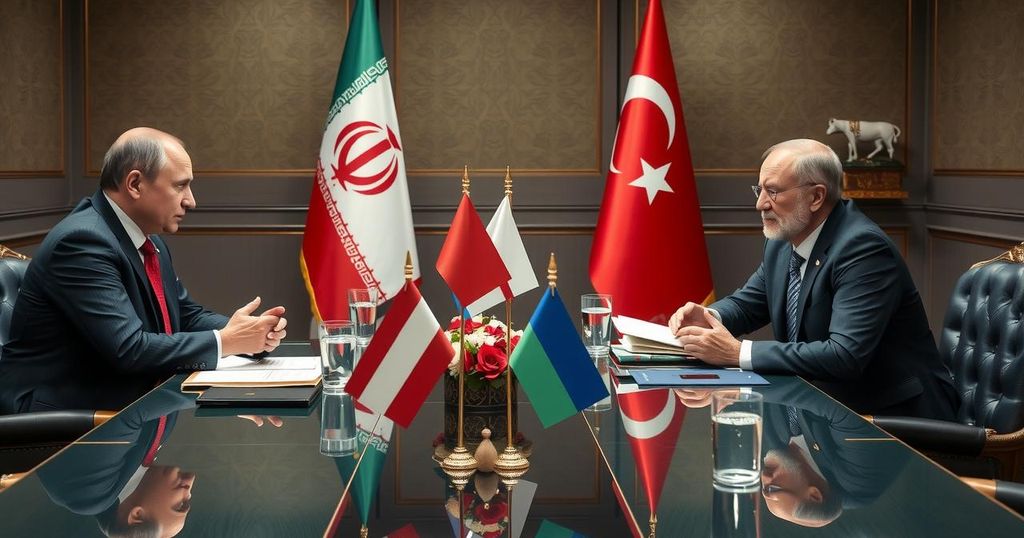Turkey, Iran, and Russia Plan Talks on Syrian War Amid Recent Rebel Advances

Turkey, Iran, and Russia will meet this weekend in Qatar to discuss the Syrian war following a major offensive by Islamist rebels, which has altered the conflict’s front lines. The talks are part of the Astana process, aimed at finding a resolution to the civil war, amidst concerns about territorial integrity and regional security. The situation remains precarious, with the U.S. also engaged in the region against the backdrop of an increasing threat from ISIS.
This upcoming weekend, Turkey, Iran, and Russia will convene in Qatar to address the significant developments regarding the Syrian civil war, particularly following a substantial offensive by Islamist rebels that has shifted the conflict’s dynamics. The discussions will occur during the Doha Forum, an international platform that gathers global officials to deliberate pressing matters. Turkey’s Foreign Minister Hakan Fidan will engage with his Russian and Iranian counterparts under the framework established by the Astana process, initiated in 2017 to promote a political resolution to the ongoing war.
Historically, the Astana process has facilitated ceasefires, notably the one brokered by Turkey and Russia in 2020, which momentarily stabilized the situation with President Bashar al-Assad maintaining control over significant territories. Recently, however, the offensive by Hayat Tahrir al-Sham (HTS) has led to the capture of key locations, such as Aleppo, and has raised alarms among government allies. As President Putin emphasizes the necessity of countering aggression, Turkish officials express their commitment to Syria’s territorial integrity while urging Assad’s regime to pursue political solutions.
Amid this evolving context, Turkey has concerns over the potential strengthening of Kurdish factions, which pose security risks and are associated with the PKK, labeled a terrorist organization. Concurrently, the U.S. military has heightened engagements in northeastern Syria, underscoring its obligation to support the Syrian Democratic Forces (SDF) against the backdrop of rising threats from the Islamic State. The complexities among these factions are compounded by the geopolitical stakes, with Russia and Iran keen on sustaining their influence while navigating the pressure of recent territorial losses.
The situation surrounding the Syrian civil war remains tense and complex, marked by changing alliances and the ongoing involvement of international powers. The Astana process, established in 2017 by Iran, Russia, and Turkey, aimed at fostering peace and stability in Syria by coordinating ceasefires and facilitating political dialogue. However, the recent resurgence of Islamist factions has disrupted previous progress, prompting urgent discussions among these key players. Turkey continues to support opposition groups, focusing on countering Kurdish influences in the region, while Russia and Iran seek to maintain their strategic foothold in Syria following changes in the battlefield narrative. U.S. involvement adds another layer to this intricate landscape as it aims to prevent a resurgence of the Islamic State and provides backing for the SDF. The stakes for regional actors are high as they navigate their interests amid evolving military conditions and heightened humanitarian concerns stemming from the ongoing conflict.
In summary, the upcoming talks in Qatar among Turkey, Iran, and Russia represent a critical effort to address recent shifts in the Syrian conflict landscape, particularly following HTS’s offensive. As these powers convene during the Doha Forum, they will confront various challenges, including maintaining territorial integrity, managing militant threats, and advancing political solutions. The interactions among these nations reflect their broader strategic aims, particularly against the backdrop of U.S. interests and regional security considerations that influence the complex dynamics of the Syrian civil war.
Original Source: www.voanews.com







